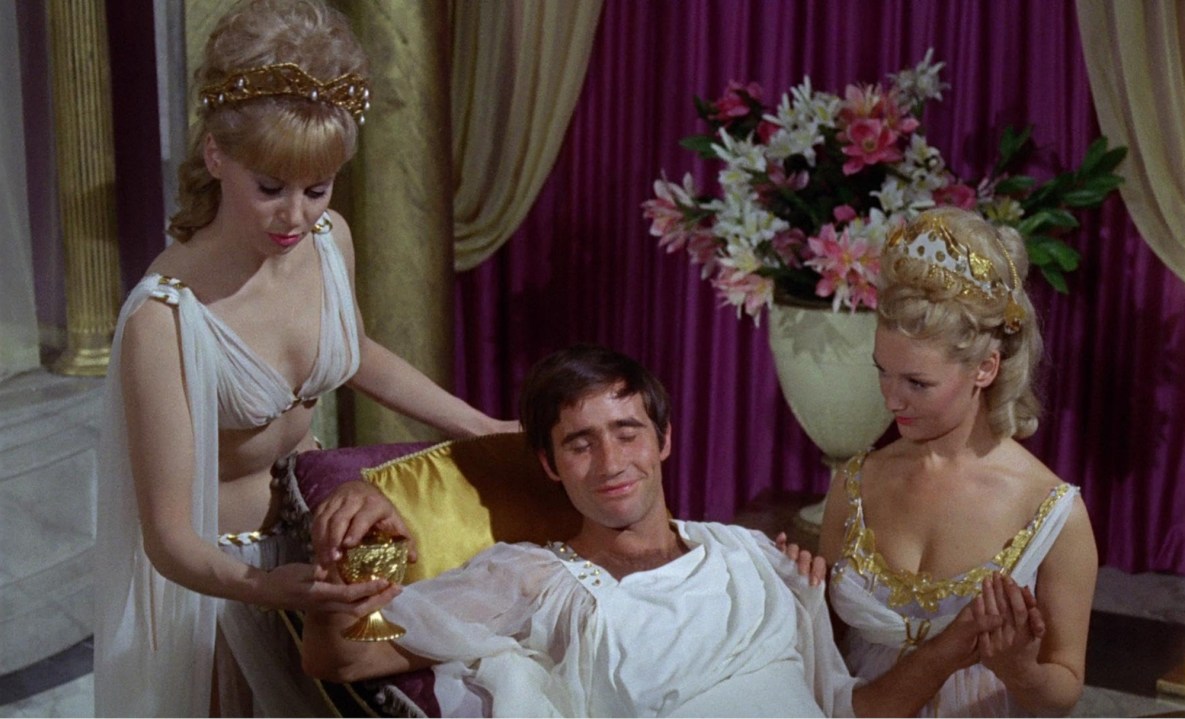Why must we all be such killjoys? Why so prudish? Why so terrified of history? In the dock this week, accused of crimes against common sense, are the bods at Ofcom, whose ‘guidance’, say broadcasters, means that Carry On films are now under threat.
It appears the Carry On films have made the unpardonable error of reflecting the social and cultural norms of their time rather than having the foresight to mirror those of half a century later
In fact, niche broadcasters of older films – and where else can you watch a Carry On film these days? – are so terrified of earning Ofcom’s wrath that they feel obliged to butcher the films by removing language and scenes that were once just jolly good seaside fun. It’s like taking the cheese and pickle out of a cheese and pickle sarnie.
We might ask what Carry On films have ever done to hurt anyone, and what crime they might have committed. Well, it appears they made the unpardonable error of reflecting the social and cultural norms of their time rather than having the foresight to mirror those of half a century later.
Ofcom’s response, therefore, is to punish history for not being current enough. So, it takes it upon itself, based on public research, to decide which words are so offensive to modern tastes that they require a ‘clear and strong contextual justification for broadcast’. This means that, as the years go by, and as social norms and attitudes inevitably change, more and more of the Carry On output is deemed unacceptable. There will soon be a naughty black market in old DVDs, I suppose.
And what exactly is Ofcom worried about? Well, in a recent report it describes how Carry on Cleo (1964) includes a scene with ‘a White actor plays an Egyptian guard. His skin is darkened with very dark make-up. He is unable to speak, using sign language to communicate instead.’ Ofcom moderators then encourage research participants to focus on this piece of offence by asking: ‘Did you notice that one of the actors is wearing dark make-up? What do you think about this? Are there any situations where it is acceptable for a television programme to show someone in blackface? Would a warning make it more acceptable?’
With questions as leading as that, it’s hardly surprising that the Carry On films are now in trouble. And of course, it’s not just Carry On. While Little Britain wasn’t offensive in 2010, it was by 2020. Fawlty Towers, with its 1970s racist Major and nasty hotel manager who bullies elderly deaf women, has no chance today. Even Friends, apparently, is too ‘cisgendered’ and ‘heteronormative’ for modern tastes. The goalposts are constantly moving.
We can’t blame Ofcom for all of that, of course. Yet in its keenness to protect sensitive viewers from offensive material, it is in danger of denying today’s generations not just the entertainment value of Carry On films, which is considerable, but an education into what post-war Britain was actually like.
You can learn more about 1960s Britain from a Carry On than from any number of academic tomes. Amid all the bottom pinching, leering and outrageous double entendres is a window into a country I was just too young for, but still recognised – of seaside holiday camps, loosening sexual norms, cultural homogeneity and a desperation to move on from wartime deprivation without the resources to quite manage it.
Must it all be lost? Well, broadcasters report their hope that a happy medium can be agreed whereby a ‘trigger warning’ at the start of older films will satisfy the censors. Fine, but I don’t see why history needs such a thing. After all, and to slightly misquote L.P. Hartley in The Go-Between, of course history is different. That’s the point. That’s what makes it so interesting. So, let’s not deny ourselves the ability to travel there and enjoy it.
Sadly, we’ve become so dismissive of individual responsibility, that we actually need a taxpayer-funded quango to police our taste in films. Well, we shouldn’t be surprised, I suppose, given that the big state already sends people to prison for offensive social-media posts and takes it upon itself to teach children how to clean their teeth.
But there is one inconsistency I’d like ironed out. If history is a matter for policing, why not geography? If the racism in Carry On films is enough to warrant a warning, why isn’t the racism in, say, Japan (which, according to research, is one of the three most racist countries on earth) not mentioned in the travel advice issued by the Foreign Office? Perhaps it’s just racist to accuse another country of being, well, racist.
None of that helps the Carry On films, of course. And Ofcom won’t change tack any time soon. So, get yourself the box set while you still can.








Comments